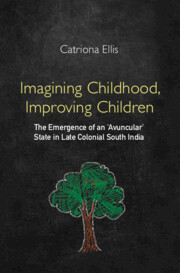 Imagining Childhood, Improving Children
Imagining Childhood, Improving Children Book contents
- Frontmatter
- Dedication
- Contents
- Acknowledgements
- List of Abbreviations
- Introduction
- 1 The Child at School: Compulsory Education in the Madras Presidency
- 2 Educating the Child: The Introduction of Compulsory Education in Madras City
- 3 Imagining the Child as Learner: Progressive Pedagogy in the Madras Presidency
- 4 Producing the Healthy Schoolchild
- 5 Saving the Child: The Madras Children Act, 1920, and the Beginnings of a Juvenile Justice System
- 6 Protecting the Poor Child: The Practical Expansion of Juvenile Justice
- 7 Defining Childhood: Sexual Parameters of Childhood
- 8 Remembering Childhoods: Childhood Memories in Autobiographies
- Conclusion: Children, Childhood and the Growth of the Avuncular State in South India
- Notes
- Bibliography
- Index
1 - The Child at School: Compulsory Education in the Madras Presidency
Published online by Cambridge University Press: 19 April 2023
- Frontmatter
- Dedication
- Contents
- Acknowledgements
- List of Abbreviations
- Introduction
- 1 The Child at School: Compulsory Education in the Madras Presidency
- 2 Educating the Child: The Introduction of Compulsory Education in Madras City
- 3 Imagining the Child as Learner: Progressive Pedagogy in the Madras Presidency
- 4 Producing the Healthy Schoolchild
- 5 Saving the Child: The Madras Children Act, 1920, and the Beginnings of a Juvenile Justice System
- 6 Protecting the Poor Child: The Practical Expansion of Juvenile Justice
- 7 Defining Childhood: Sexual Parameters of Childhood
- 8 Remembering Childhoods: Childhood Memories in Autobiographies
- Conclusion: Children, Childhood and the Growth of the Avuncular State in South India
- Notes
- Bibliography
- Index
Summary
The Madras Elementary Education Act, passed in 1920, was intended to facilitate the reorganisation of educational provision and encourage the introduction of compulsory education in local authority areas throughout the Madras Presidency. This was innovative on its own terms and stands in stark contrast to the complex and multifaceted opposition to compulsory education at an all-Indian level. Although still an optional, rather than required, function for local councils, it was part of a raft of measures that contributed to a wider re-conceptualisation of both Indian childhood and the relationship between the state, the family and the child in the interwar years. Compulsory education was a significant symbol of the progressive modernity of the Indian legislators and social activists, seen to be an essential component of the modern industrialising state and modern forms of governmentality to which these elites aspired. Underpinning this was a new normative characterisation of the child as a learner and in school, a sharp contrast to the manual and household labour that had previously been the experience of most children. The institutionalisation of children within the spatial, temporal and authoritative boundaries of government-approved learning demonstrated a commitment to a universal idea of children as malleable and vulnerable and as the responsibility of the modern state. Central to this conception of a normative childhood was the increasingly widespread belief that education should be free and accessible to all. The inherent contradiction that this would only be applied in areas with sufficient political will and sufficient funding and infrastructure was largely disregarded.
The first part of this chapter considers the figure of the normative modern child in school and the ways in which Indian politicians and officials increasingly conceived childhood as defined by chronological age boundaries. Yet, in practice, when the Education Act was implemented, children were more often imagined within the identity politics of the presidency, and compulsory education actually strengthened the production of educational communities based on social categories of caste, class, religion or gender. Historians such as Barnita Bagchi, Joseph Bara and Latika Chaudhary have already demonstrated how social hierarchies informed children's access to education and were used to maintain an elite's access to power, revealing how the diversity of communities in south India impeded the expansion of education.
- Type
- Chapter
- Information
- Imagining Childhood, Improving ChildrenThe Emergence of an ‘Avuncular’ State in Late Colonial South India, pp. 24 - 46Publisher: Cambridge University PressPrint publication year: 2023


